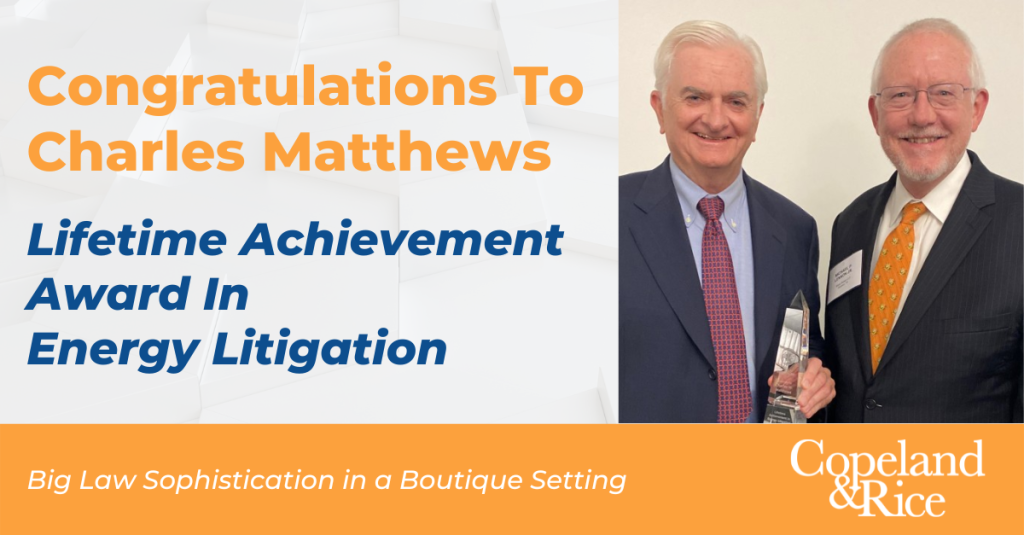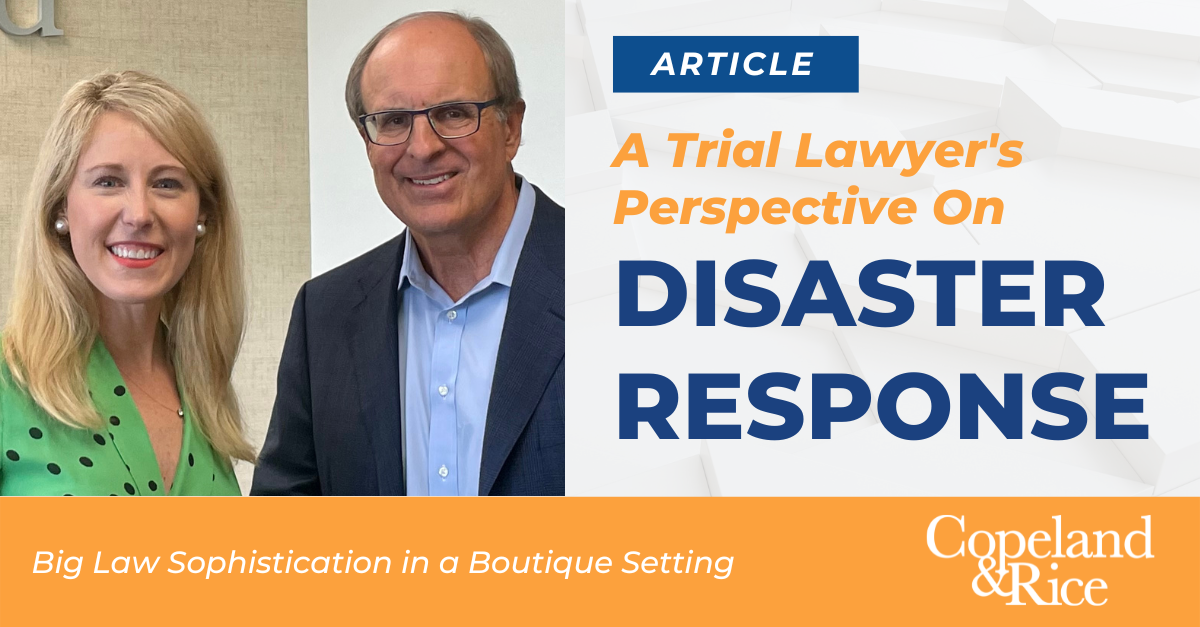By Morgan L. Copeland, Jr. and Tracey K. Rice
I. Background
A significant spill, release, fire, or explosion can cause substantial damage to a company. When faced with a sudden, catastrophic event of this kind, counsel and corporate decision makers must respond quickly on multiple fronts to diverse, complex issues that demand timely decisions and decisive action. It is all too easy for decision makers to be overwhelmed by the immediacy and urgency of the demands imposed by the crisis and to ignore the steps that are essential for preparing for the successful defense of litigation. The company’s ability to avoid damage to stock value and reputation or a potentially catastrophic damage award by a court or jury will depend on proper preparation that addresses not only safety systems and regulatory compliance but also anticipated litigation. If considerations of such issues and related strategy are deferred until the immediate rush to respond is over, critical mistakes may have already occurred, making a bad situation worse. Actions taken without consideration of possible litigation implications can result in the loss of key evidence or, worse yet, hand opponents new and powerful ammunition that can inflame the situation, increase litigation risk, and enhance the potential for adverse damage awards.
II. Confirm Notifications Required by Law and Company Procedures
Company responders should be trained on and intimately familiar with the portions of the company’s emergency response plan that address notification of governmental authorities, including local and state law enforcement authorities, fire departments, environmental agencies, and regulatory authorities. While the failure to notify one or more of these entities may seem trivial or without consequence, such an omission can be costly in the litigation arena. For example, consider a gasoline spill into a body of water. Predictably, a fire results, but company and governmental records reflect that no notifications were provided to local law enforcement agencies or fire departments. Although there may be little or no evidence that such a notification would have prevented the harm suffered by individuals at the water’s edge when the ignition occurred, an aggressive lawyer may spin this omission as a lack of care and concern for public safety. Failing to follow the company response plan provides opportunistic lawyers with ammunition and arguments that, even if unconnected to actual harm, can be hurtful in practice.
III. Develop and Implement a Media Strategy
Ignoring or incorrectly handling the media in the middle of a crisis can seriously handicap the company in the “court of public opinion” before litigation even begins. Statements made by the company and its employees during the maelstrom of a disaster are evidence. All too often such communications are made without the benefit of full information by persons unschooled in dealing with the media or by multiple personnel acting without proper coordination. Seemingly innocent answers to questions shouted by a mass of reporters can be distorted and twisted by opposing counsel with the intent to show that the company failed to warn the public, hid or destroyed information, violated safety regulations, responded ineffectively, deceived the public, or committed fraud. Visualize an employee with little to no media training wading into an army of radio and television reporters with live microphones and cameras rolling. Over his shoulder, a large hydrocarbon-fed fire rages in the distance, with smoke plumes wafting toward heavily populated areas. In response to a question regarding the toxicity of the smoke, the employee responds, “it’s just gasoline, it shouldn’t be a problem.” While this statement may be true as it pertains to the particular plaintiffs involved in your lawsuit, it does not pass muster as an unqualified and comprehensive statement concerning the potential hazards from smoke or fumes emitted by burning hydrocarbons. When the newsreel containing this statement is played back during the employee’s deposition or, worse yet, in front of the jury while he is testifying, the jury may make up its mind before even hearing what may be an honest and defensible explanation. Accordingly, dealing successfully with the media is critical.
A. Designate One Media Spokesperson
Take charge of the news flow by giving the news media a credible, concerned, and fully committed spokesperson. Optimally, this person should have media training before the incident. All media contacts, including responding to questions, handling press conferences, and issuing press releases, should be channeled through the media spokesperson. If possible, counsel should provide the media spokesperson with talking points and review all written statements made by the media spokesperson. This will ensure that the statements are accurate, that the release of information complies with applicable regulations, and that the statements do not jeopardize the defense of the lawsuits that are likely to follow.
B. Use of Media Consultants
The use of a media consultant after a disaster should be carefully considered. A good media consultant will have experience dealing with high profile, volatile situations and can provide valuable advice on what to expect from the media and the company’s options for responding. However, some media consultants are inexperienced in the litigation context and may do more harm than good.
IV. Deal Effectively With Government Investigators
Significant disasters will draw a response from several levels of government. Depending on the circumstances surrounding the incident, regulatory agencies such as the following may respond:
- National Transportation Safety Board
- Chemical Safety Board
- Federal Bureau of Investigation
- Department of Transportation
- Environmental Protection Agency/State Analogue
- Occupational Safety and Health Administration
- Local law enforcement
- Fire departments
Representatives from some or all of the agencies involved will demand site access, company records and interviews with company employees. To manage these information gathering efforts:
A. Designate a Single Point of Contact
Designate a single point of contact within the company to coordinate all document productions to governmental agencies. This person must keep track of what information has been requested by the government and what information has been provided to the government. The company should keep a copy of everything provided to the government.
B. Manage Access to Company Employees and Facilities
While the company should make every effort to cooperate with the governmental investigations, access to the company’s facilities and company employees should be managed by the company. To the extent possible, access to company facilities by government investigators should be guided and limited to relevant areas.
Similarly, the company should control the logistics for meetings with company employees. For example, an employee is in no shape for an interview with governmental agencies after working a double shift in response to a disaster. In addition, employees should be prepared to provide accurate information during governmental interviews. Employees need to be reminded to avoid speculating or making statements that are beyond their knowledge.
C. Monitor Government Investigator Interviews
If permissible, counsel or a company representative should monitor employee interviews. This will give the company contemporaneous possession of the same information as the government. If a company representative is not granted access, it is important to interview employees immediately following the interview to determine what the government asked about and what answers were given.
V. Preserve Physical and Electronic Evidence
In the immediate aftermath of a disaster, it is important for the company and its investigators to take the appropriate steps to preserve evidence. Some of the more obvious preservation requirements include relevant equipment and paper and electronic documents. In addition however, the company should take the steps necessary to preserve and maintain real time data recorded during the event. Often, such data is maintained in the regular course of business for only a short time and then recorded over. For example, supervisory control and data acquisition (SCADA) systems record data in real time, including information regarding pressures, flow rates, and other parameters. While the company may have a valid argument that such data is insignificant to the real matters in dispute in the litigation, or that the data can be obtained or reconstituted from other sources, opposing counsel may argue that the data was intentionally lost or destroyed. Under certain circumstances, the court may provide instructions that allow a jury to infer that the lost documents or data would have been adverse to the company. At best, considerable time, effort, and money will be spent by the company and its lawyers in defending against such peripheral and distracting charges.
Moreover, there are frequently other important clues that can be lost if immediate steps are not taken to gather, preserve, and record relevant information. Engaging competent litigation counsel to assist in the initial response and to deal with regulatory inquiries will also provide valuable insight into the preservation of evidence that may be critical to the company’s defense in subsequent litigation. The company should also consider immediately retaining though counsel a litigation-savvy expert skilled in accident reconstruction who can document what happened and preserve evidence in its original state.
Similarly, photographs can also provide a valuable tool to validate computer or other mathematical models. Not all photographs are created equal, however. Careful composition of the photograph is necessary to incorporate all of the relevant information, and these matters are frequently best left to qualified experts whose litigation experience will allow them to create the most effective and defensible photographic evidence.
VI. What to Look For and How to Gather Evidence
A. Capture Key Information With Employee Interviews
Memories fade quickly. In an emergency response, key employees frequently work long hours under substantial stress. This condition can cause events to run together in memory and result in a subsequent lack of clear recollection of important facts or events. Conducting interviews of employees who are involved shortly after the immediate emergency has subsided provides the best opportunity for capturing critical details of the incident and response, and other relevant chronology.
B. Interview Relevant Third Parties
For the same reasons, begin interviewing third-party witnesses who may have knowledge concerning the facts of the case as soon as possible. These may include, if permissible, local, state, or federal governmental agency employees.
C. Obtain Documents From Third Parties
Like the memories of witnesses, documents can disappear with time. Third parties may not have any reason to keep documents that could prove to be important to defense of the future litigation. Requesting documents shortly after the incident increases significantly the chances that they may still exist. An example where obtaining third-party materials quickly is particularly important is television video footage and photographs possessed by newspapers and other media companies. Often, this is the only real time video or photographs available of the event. This footage may be essential for an expert attempting to reconstruct events. Television news stations, however, and video monitoring services typically have limited retention times for video. If these materials are not captured very quickly, they will be gone forever.
D. Obtain Documents From the Government
Use the federal Freedom of Information Act (FOIA) and the applicable state analogues to obtain all of the government documents that are relevant to your case from federal, state, and local government agencies. Government agencies have an enormous amount of relevant and useful information, and much of it is available via a FOIA request. Unfortunately, this information frequently resides in a number of widely dispersed and poorly organized files buried within the bowels of an agency.
Crafting a FOIA request to obtain all of the documents you need without receiving an overwhelmingly over-inclusive or under-inclusive response is an art. Your request must assist the FOIA officer in finding the documents. If it does not, your chances of actually getting everything available are slim.
E. Obtain Physical Evidence From the Government
Split samples taken by the government if permitted, or keep a list of all physical items collected by the government, if split samples are not permitted. Plan to have your experts participate in setting up testing procedures and observe any testing on the samples performed by the government.
F. Anticipate Document Discovery
Document production in litigation initiated by private litigants as well as the government is more often than not a massive undertaking involving deadlines. As employees are being interviewed, begin the process of identifying what documents are available and where they are stored. This is also a good opportunity to begin identifying documents key to the litigation, as well as emphasizing to employees the importance of document retention and evidence spoliation issues.
Ultimately, because certain federal statutes take the company’s regulatory compliance history and good faith into consideration, obtaining information about the company’s efforts to comply, its record-keeping practices (including its operations and maintenance manual and safety logs), and its relationship with its state regulators will become vital to the preparation of a successful defense.
VII. Handling Damage Claims
If an incident has the potential to affect large numbers of area residents, you may be faced with claimants demanding food, shelter and financial assistance, not to mention claims for personal injury and property damage. Likewise, the company may be required by environmental laws to open a claims office and to publish notices regarding how to make a claim against the company. Dealing with these issues presents important strategic decisions that may well affect the nature and volume of future litigation, the settlement values anticipated by litigants and counsel, and the confidentiality of the company’s settlement negotiations and agreements.
On the one hand, it may be possible to act proactively and settle many of the claims that would otherwise end up in the hands of aggressive lawyers, saving the company litigation costs and settlement payments or jury awards. On the other hand, attempting to settle large numbers of claims may not save the company any money and may encourage and stimulate even more litigation.
Similarly, the company may be tempted to reimburse local residents or hospitals for medical bills on a “no questions asked” basis. Such decisions may make it very difficult to dispute the legitimacy of these charges in later litigation brought by the same persons even though no credible injury is present. There is no cookie-cutter solution for every situation. Decisions concerning how to approach the claims-handling process must take into consideration various factors and should be made in consultation with company trial counsel.
If the company elects to set up an initial claims process, do not neglect to establish contact with your insurance carriers. The insurance carriers will likely want to be involved in whatever procedures are established for early settlement of claims.
VIII. Notification of Insurers and Dealing with Coverage Issues
After an incident, the company must ensure that insurers are notified of the loss in a timely manner. The insurance policy should be read from cover to cover and identify any potential coverage issues immediately. In examining first party policies, most important are finding applicable exclusions from coverage, making sure that the loss suffered is in fact covered, and identifying any policy-specific instructions as to quantifying the company’s losses. Understanding timing issues under the policy, such as the filing deadlines for establishing proof of loss, for filing suit, and for invoking any applicable appraisal provisions, is also crucial. Similarly, the insured company needs to make an immediate effort to obtain and review loss related documents. It is also helpful to have an internal team working to satisfy proof of loss documentation and causation issues pertaining to damages sustained by the company.
Also recommended is the retention of separate counsel to handle coverage issues and possible disputes with liability insurers. There are several reasons to segregate the defense of the mass tort case from the insurance coverage representation. First and most obviously, insurance coverage litigation is a practice area that is distinct from tort litigation, and requires counsel with expertise, experience, and knowledge of the subject matter. Second, the handling and defense of tort litigation may generate significant legal fees, and it is not uncommon for liability insurers to challenge the amount of attorney fees and defense costs. If the attorney handling the coverage dispute is a member of the firm charged with leading the tort defense, coverage counsel will be placed in the awkward position of defending work performed and fees charged by his or her partners and associates, potentially diminishing credibility and the ability to persuade. Third, the intertwining of the tort defense and coverage matters presents the potential for other troublesome issues. For example, the possibility of waiver of privilege may become an issue. It is foreseeable that the actions and strategies of the tort defense lawyer may become factually relevant in subsequent coverage litigation. In such event, the insured company may need the testimony of defense counsel as proof in the insurance case. The necessary disclosures may involve waiver of privilege with respect to the tort defense. If the same law firm represents the company in both the liability defense and the coverage litigation, the possibility of an across the board waiver of privilege is a risk, resulting in the waiver of privilege involving the law firm’s representation of the company on all matters, including the insurance coverage dispute.
IX. Was There a Crime?
Over the past several decades, criminal enforcement of energy and environmental laws has increased substantially as a result of increased public interest, increased enforcement staffing, and additional enforcement laws. In past years, the federal government has initiated a number of criminal investigations following spills or releases. Additionally, occupational health agencies such as OSHA or even the local district attorney may become involved if company employees or contractors are seriously injured or killed in the incident. Criminal enforcement can divide an otherwise unified front and place extreme pressures on the company and its employees.
It is essential that corporate counsel assess the possibility of criminal enforcement. The company should consider whether to hire counsel for employees who are potential targets. On the one hand, hiring counsel for an employee assures that the employee will have competent representation. Such counsel can assist the employee in preparing for interviews and avoiding costly mistakes. On the other hand, other considerations may counsel against the company shouldering this responsibility. Such decisions must be made quickly in consultation with knowledgeable counsel.
X. Local Counsel
It is imperative to identify and retain the best and most appropriate local counsel in the jurisdiction where the litigation is pending. Many post-disaster cases are not filed in large metropolitan areas, but in relatively small or middle-sized venues where knowledge of the judiciary and local populace is critical. There are typically only a handful of local lawyers who possess this important knowledge, and their identities are no secret. If you fail to move swiftly in identifying and hiring these local attorneys, they may well be hired by opposing counsel.
XI. Expert Witnesses
Many cases include common issues and there are only a limited number of top flight expert witnesses who can deal with them. You want experts who are both outstanding in their areas of expertise and effective witnesses. Good experts will be critical to your success, so act quickly and hire the good ones.
XII. Conclusion
Companies go to great lengths to avoid catastrophic events. However, despite industry’s best efforts, these events are an unfortunate reality. Preparation is necessary not only to avoid loss of life and injury and limit the environmental and direct economic consequences, but also to limit litigation driven liability. The time to prepare is now.
_____
Contact Us
To learn more or for help in a disaster response situation, please reach out to Morgan L. Copeland, Jr. (mcopeland@nullcopelandrice.com) or Tracey K. Rice (trice@nullcopelandrice.com) or call 832-849-1805.




